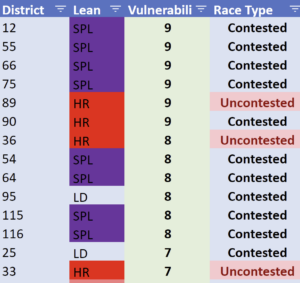What elected seats are most winnable?

Part of our mission at SC WIL is to encourage more women to step up and run for elected office. But not all seats represent equal opportunities. Some seats, because of the nature of their history and political leanings, are not viable options for every prospective candidate. To assist women in selecting (and winning!) the seats that are most viable with respect to their campaigns, we’ve built a suite of tools to support decision-making. We want women to have access to data that helps them determine where their best paths to success lie.
This program will assist those seeking a competitive elected office. If you are interested in appointed office, please contact Emily Bowerman, our Director of Appointed Office.
SC WIL has compiled thousands of pieces of public, precinct-level voter data from past elections and had it analyzed by data experts to determine how hard a seat leans toward one party or the other. That same analysis shows how potentially vulnerable the current office holders are, whether from an opposing-party challenger or a same-party challenger. The analysis has been done for SC House and SC Senate districts. Because it is based on precinct-level data, it is not too hard to make similar determinations for other offices (county council, school board, etc.). The intention of this project is to focus SC WIL and its participants on seats that are most winnable within a region or district.

The vulnerability ranking is at the heart of what we believe is the value of this resource. Seeing to what extent (and to what party) seats are vulnerable can help potential candidates determine how hard it would be likely to challenge a given seat, and thus whether or not it’s likely to be worth the effort and expense for that potential candidate.
SC WIL presents an overview of this data in small, virtual groups at least one time each month. Following these overviews, SC WIL can share district-specific portions of the data in short, private appointments to prospective female candidates and/or their campaign teams to help them determine whether they think a campaign is feasible and to glean information about how best to position themselves to be successful in that district.
Notably, this project will not, at this time, include Municipal, County, or Federal election results or predictions.
Check our event schedule for the next Opportunity Seats meeting or sign up here to learn more.
NOTE: SC Women In Leadership (SCWIL) is a multi-partisan non-profit organization that promotes democracy by encouraging women to become informed about public issues and active in the public debate. WIL does not endorse particular views, legislation, or candidates for public office.
Frequently Asked Questions
A: Some seats are districted in a manner that historical voting results suggest causes them to be determined by one party or another. If a district has historically voted Republican, it may be difficult for a Democratic candidate to overcome long-standing voting patterns. The most viable candidate in this situation could be one who is well-known and respected in the same party as the seat holder with that election being focused on the primary rather than the general election.
A: In a private and scheduled session, we can analyze the voting patterns of the precincts included in the new lines of a district to obtain a better understanding of that district’s lean (is it likely to change?).
A: No! While our data is informative, we can not say with 100% certainty that a low vulnerability rating means you have no chance of winning a particular seat. You may have a lower chance of winning, but that doesn’t mean you have no chance at all. Additionally, your profile, the environment during the election, and many other factors influence the outcome. Our data is meant to provide an idea of the outcome, based on historical data, so that you are able to develop a strategy for your campaign!